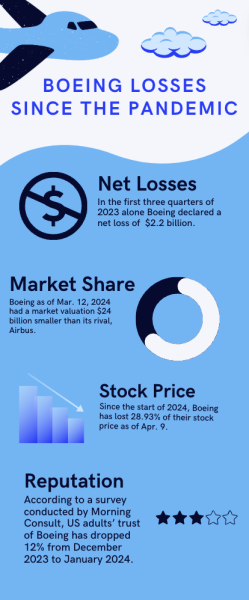After multiple emergency landings and system malfunctions, 2024 is off to a rocky start for aerospace manufacturer Boeing. The aviation giant lost $46 billion in the past four months due to safety issues related to their 737 MAX planes.
Boeing’s issues began this year on Jan. 5, after Alaskan Airlines Flight 1282 experienced a door panel blowout and its crew was force to make an emergency landing. Luckily, no one was seated near the door so there were no severe injuries but multiple items were jettisoned due to the change in pressure. In the aftermath of this incident, Boeing paid Alaskan Airlines $160 million for the damages.
Following this incident, the FBI and FAA began to investigate Boeing’s production practices. While the FBI investigation is ongoing, the FAA’s investigation concluded after 89 audits on Boeing and 13 on their parts manufacturer, Spirit AeroSystems. The company failed 33 of their audits with 97 errors recorded, while Spirit AeroSystems failed seven, in which workers were filmed using hotel key cards to check seals and Dawn soap to lubricate parts.
In the aftermath of the incident, CEO of Boeing Commercial Airplanes, Dan Steal, and chair of Boeing’s board of directors, Larry Kellner, both stepped down from their positions – among other executives in the company. Dave Calhouln, the CEO of Boeing as a whole, has also announced that he will be leaving Boeing by the end of 2024.

Calhoun was appointed CEO in 2020 following Boeing’s previous scandal, in which 737 MAX flights from Lion Air and Ethiopian Airlines in 2018 and 2019 crashed due to flight instability issues due to Maneuvering Characteristics Augmentation System (MCAS) malfunctions, leading to the deaths of 346 people.
The incidents led to a recall of all 737 MAX and a criminal lawsuit. Due to the lawsuit, Boeing agreed to pay a $2.5 billion penalty due to criminal charges of accusations that it concealed information about the 737 MAX.
In the months since the Alaskan Airlines incident, Boeing delayed manufacturing of their planes. Following this decision, United Airlines began to urge pilots to take unpaid time off due to the expectation of receiving fewer aircrafts from Boeing this year.
There have also been numerous United Airlines flights that resulted in emergency landings. On Feb. 29, a Boeing 757-200 had to make an emergency landing in Denver after discovering minor damage on the right wing. In another flight on March 7, a Boeing 777 departing from San Francisco lost a tire during takeoff, which collided with multiple employee cars in one of the airport’s surface parking lots.
Following all these incidents and investigations, Boeing has lost a significant share of the airline market to Airbus, which could take the company years to recover.
However, if the company wishes to recover its market share, it should follow the advice that the FAA members and other experts give: prioritize quality control over production.
Although the loss of production would lead to smaller profits, the planes manufactured would be safer and perform optimally, leading to a smaller need for reparations. Safer planes would also lead to the company to pay fewer penalties to airlines and governments, which could lead to Boeing saving millions of dollars each year.
Most importantly, safer airplanes would lead to fewer emergency landings, which would greatly improve the company’s public reputation. In any business, having a positive or negative reputation could mean the difference between a company reaching a new earnings record or filing for bankruptcy.
Reputations in the air travel industry are no different, as they impact which airlines want to contract a company and how many planes they intend to buy.
Despite all the opinions of experts in the field, it is undetermined whether Boeing will implement these changes into its production line. Whether the company continues to lose to Airbus in the market or begins to make a comeback is dependent on its decisions in the remainder of 2024.














































































